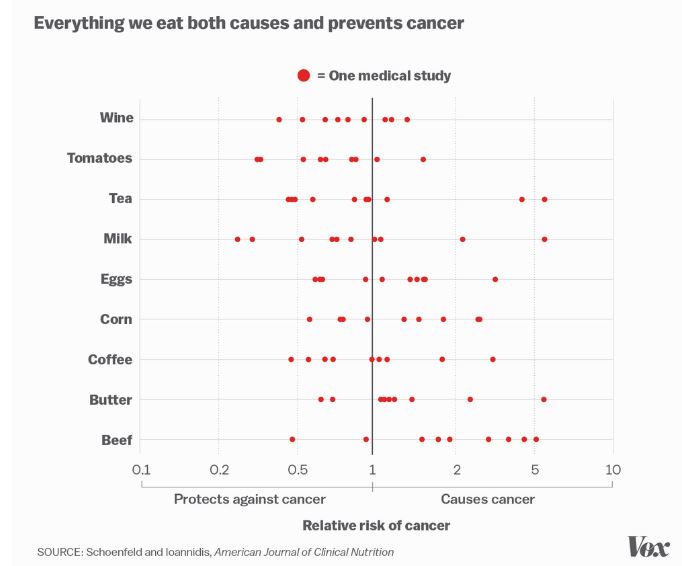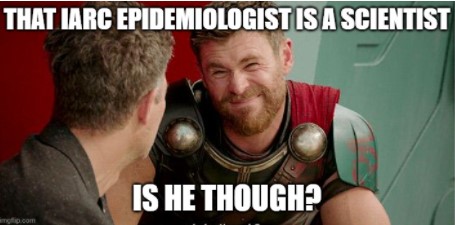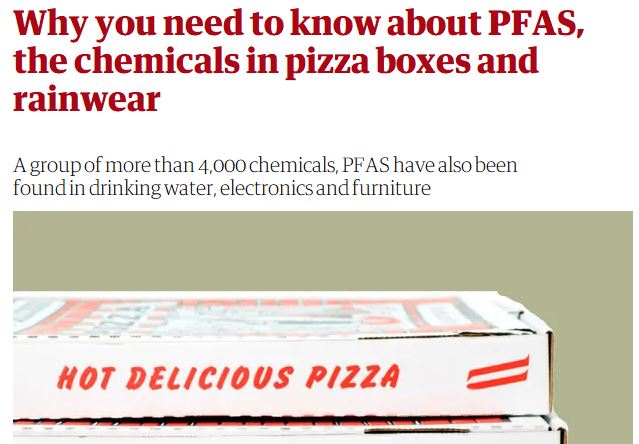Yet today, IARC epidemiologists claim bacon is as bad for you as plutonium, that plants are little people, and sugar-free gum will give you cancer. Not only have they lost their way, they are running jokes everywhere except fringe fellow travelers like Ramazzini Institute, Harvard School of Public Health, and the US National Institute of Environmental Health Sciences.(1)
Multiple times per year they are declaring something new a cancer-causing agent. In science reality, there are no new carcinogens to find. That's right, none.(2)

Though there are none left to find, IARC has to keep manufacturing new carcinogens or else they have no mandate, so they have gone off in the weeds searching for new obscure links to cancer, like diesel emissions (I debunked that one here), virtual pollution, and cell phones. Even chemicals in coffee and tea got attacked.
It wasn't always that way. IARC started with the best intent, it was run by a personal hero of mine, Dr. John Higginson, but began to decline rapidly in the 1990s, and in 2009 their reputation began to crater. All due to self-inflicted wounds.
Their biggest self-inflicted wound is 'scoping.'
If you are a politician and want to claim you raised people out of poverty, you can simply change the scope of poverty. Lower the poverty level by $1000 a year and 10 percent of people have been rescued from it by your economy. We see it today with claims about how many jobs have been created by the White House - by leaving out that over 70 percent of those jobs were cut due to the pandemic.(3)
IARC can claim legitimacy for even its most specious claims by changing the scope of what warrants investigation. They created a monograph for aspartame using papers so flawed that the US FDA and every other legitimate world body said the claims were unfounded.
Their second biggest self-inflicted wound is banning the best and brightest epidemiologists
In 2009, IARC's most disastrous director, Chris Wild, responded to "criticisms" - all of which were by political allies of IARC, which smacks of collusion - that their Working Groups had too many ties to 'industry.'

So IARC banned anyone who had ever consulted for industry. Let's be real, if you have never been asked to consult by industry, you are not very good at your job. The private sector hires the best, and when the best can't be hired, they pay them to consult.
Their third biggest self-inflicted wound is a reputation for hidden conflicts of interest
IARC banned anyone who has consulted for the private sector but not anyone who consults for a $3 billion industry - environmental groups. With the best experts banned, environmental groups exploited a loophole that IARC intentionally created; you could not only be an active consultant for an environmental group, you could be consulting for an environmental group in an active PR campaign against the chemical that your Working Group was studying.
If you wanted to be first to cash in on the result you helped create, you could sign an expert witness contract with a lawyer ready to sue over the mongraph you helped write - before the monograph was even sent to a journal. Like IARC's Chris Wild did.
Epidemiologists continue to circle the wagons around IARC, but they know if IARC's reputation is trashed the field is only left with Harvard claiming miracle foods help us live longer using diet surveys. And the astrologers of toxicology, the US NIEHS, declaring everything a Scary Chemical that IARC doesn't get to first.

What epidemiologists fail to recognize is that by not demanding better of IARC, they harm public trust in their field at times when the public needs trusted guides, like during the COVID-19 pandemic.
NOTES:
(1) Those bodies all have a lot of epidemiologists who want to do what IARC seeks to do - create a correlation between some chemical and cancer, declare industry the next Big Tobacco, and get expert witness contracts from lawyers, some of whom they already consult for while declaring no Conflict Of Interest, and some for whom they signed expert witness contracts with before the IARC Monograph is released.
With aspartame, even the World Health Organisation, who have been forced to apologize for the group numerous times over the last two decades, claiming made-up nonsense like it "follows strict scientific criteria, and the classification system is recognized and used as a reference all around the world. This is because IARC evaluations are based on independent scientific review and rigorous criteria and procedures", said IARC was out there.
(2) Some in science media will object to such absolutism, and engage in a lot of 'on the other hand' rationalization and declaring anyone who speaks plainly a bad science journalist. Then wondering a week later why environmentalists win the culture wars against science every time and go back to their day job thinking about fruit flies.
(3) Or that high inflation means your economic policies, which basically consisted of giving trillions of dollars to government union employees, is working too well and needs high interest rates to combat it being so successful.




Comments